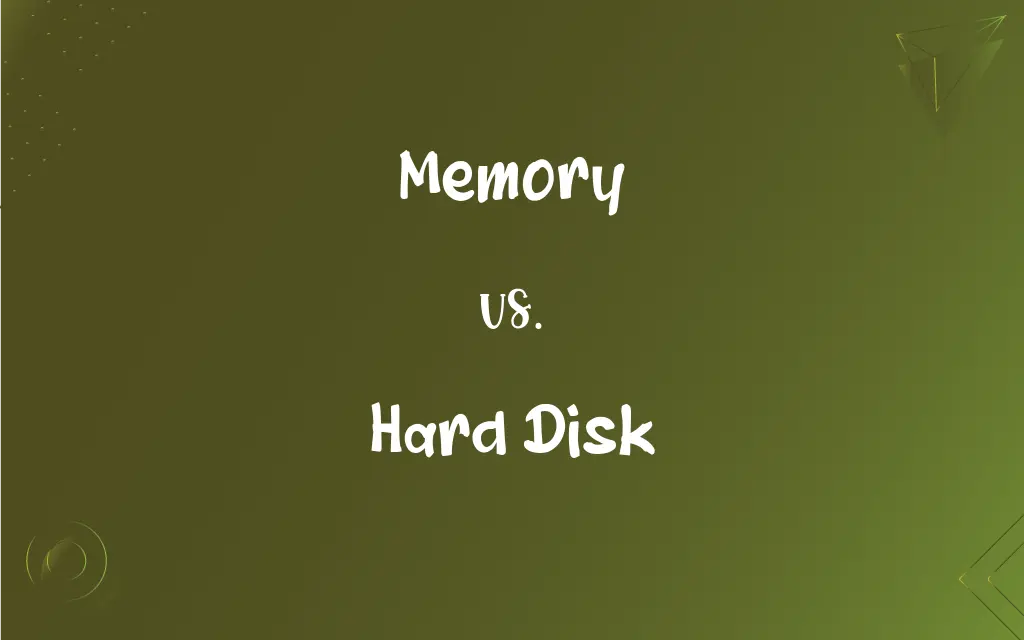Memory vs. Hard Disk: What's the Difference?
Edited by Aimie Carlson || By Harlon Moss || Updated on October 5, 2023
"Memory" refers to a computer's short-term data storage, while "Hard Disk" is a long-term data storage device.

Key Differences
In computer systems, "Memory" often relates to Random Access Memory (RAM), a volatile storage medium that temporarily holds data the computer actively uses. Conversely, "Hard Disk" denotes a non-volatile storage device that persistently saves data, even when the system is off.
The role of "Memory" in a system is analogous to a person's working desk where they access immediate items for their tasks, facilitating faster and seamless operations. On the other hand, the "Hard Disk" acts as a filing cabinet, storing records and data for extended periods and retrieval when needed.
Another distinction is the speed. Typically, accessing data from "Memory" is faster than from a "Hard Disk". This is because RAM is structured for quick data retrieval and immediate processing, whereas the Hard Disk prioritizes larger capacity and durability over speed.
Durability and data persistence contrast the two as well. When a computer shuts down, the data in "Memory" is wiped clean, ensuring it starts afresh every time. In contrast, the "Hard Disk" retains its stored data, making it essential for saving files and system data.
Finally, from a physical perspective, "Memory" comes in stick-like modules installed directly onto the motherboard, while "Hard Disks" are bulkier devices, often encased and connected via data cables.
ADVERTISEMENT
Comparison Chart
Type of Storage
Volatile (temporary)
Non-volatile (persistent)
Speed
Faster data access
Slower compared to Memory
Data Persistence
Data lost when powered off
Data retained even after power off
Physical Form
Stick-like modules
Bulkier devices, often encased
Primary Role
Immediate processing and temporary storage
Long-term data storage
ADVERTISEMENT
Memory and Hard Disk Definitions
Memory
Volatile storage used for immediate data processing.
When running multiple applications, you need ample Memory to avoid slowdowns.
Hard Disk
A non-volatile storage device for long-term data retention.
I saved my files on the Hard Disk for safety.
Memory
A system's temporary workspace for active tasks.
Upgrading the Memory can improve a computer's performance.
Hard Disk
The main repository for a system's OS, applications, and files.
I upgraded to a larger Hard Disk to store more movies.
Memory
Electronic storage that loses data when powered off.
A sudden power cut caused all the data in the Memory to be lost.
Hard Disk
A magnetic storage medium with spinning platters.
The Hard Disk started making noises, indicating potential failure.
Memory
The component that temporarily holds active data.
The game demands more Memory to run smoothly.
Hard Disk
A device retaining data even when the system is off.
Despite the crash, my data on the Hard Disk was safe.
Memory
The RAM components of a computer system.
My computer has 16GB of Memory installed.
Hard Disk
A computer's primary device for saving system and user files.
The Hard Disk in my computer has a capacity of 1TB.
Memory
The mental faculty of retaining and recalling past experience.
Memory
The act or an instance of remembering; recollection
Spent the afternoon lost in memory.
Memory
All that a person can remember
It hasn't happened in my memory.
FAQs
Is virtual "Memory" the same as physical "Memory"?
No, virtual Memory uses Hard Disk space to act like RAM when physical Memory is full.
Which is faster, "Memory" or "Hard Disk"?
Memory is typically faster than Hard Disk.
Can a computer work without "Memory"?
No, Memory is essential for a computer's operation.
Do all computers have the same type of "Hard Disk"?
No, computers can have HDDs, SSDs, or hybrid drives.
Can data be recovered if deleted from the "Hard Disk"?
Often, yes. With special software or services, data might be recoverable.
How do I clean up my "Hard Disk" to free space?
Use disk cleanup tools, uninstall unused programs, and delete unnecessary files.
Can I upgrade both my "Memory" and "Hard Disk"?
Yes, most computers allow for both Memory and Hard Disk upgrades.
Is "Memory" the same as storage?
No, Memory refers to RAM, while storage often refers to devices like Hard Disks.
How do I check my computer's "Memory" size?
On most systems, you can check through system properties or settings.
Is it bad to fill up my "Hard Disk" completely?
It's advisable to leave some free space for system processes and optimal performance.
Does a computer's performance depend on "Memory"?
Yes, adequate Memory is crucial for smooth performance.
Do all computers use the same kind of "Memory"?
No, there are different types like DDR3, DDR4, and more.
How long does a typical "Hard Disk" last?
It varies, but many last 3-5 years or more with proper care.
Can "Memory" be used as a permanent storage solution?
No, Memory is meant for temporary data storage.
Does adding more "Memory" increase storage capacity?
No, Memory affects processing capacity, not storage.
Is there a limit to how much "Memory" a computer can have?
Technically yes, based on the motherboard and OS specifications.
Can I use an external "Hard Disk" with my computer?
Yes, most computers support external Hard Disks via USB or other connections.
What's the difference between an HDD and an SSD "Hard Disk"?
HDDs use spinning platters; SSDs use flash memory, making SSDs faster and more durable.
Does "Memory" retain data when the computer is off?
No, Memory (RAM) is volatile and loses data when powered off.
How do I know if my "Hard Disk" is failing?
Common signs include strange noises, frequent crashes, and corrupted files.
About Author
Written by
Harlon MossHarlon is a seasoned quality moderator and accomplished content writer for Difference Wiki. An alumnus of the prestigious University of California, he earned his degree in Computer Science. Leveraging his academic background, Harlon brings a meticulous and informed perspective to his work, ensuring content accuracy and excellence.
Edited by
Aimie CarlsonAimie Carlson, holding a master's degree in English literature, is a fervent English language enthusiast. She lends her writing talents to Difference Wiki, a prominent website that specializes in comparisons, offering readers insightful analyses that both captivate and inform.
































































